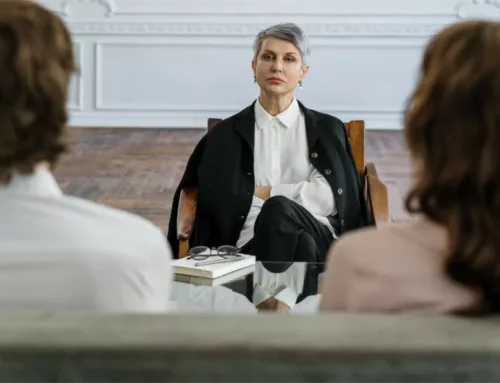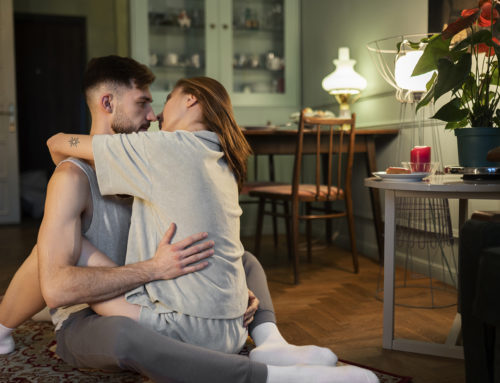Conflict is a natural part of most relationships. It can arise from even the smallest issues like one partner forgetting it was their turn to take out the trash.
It’s extremely common for these little grievances to lead to crossed words between partners.
Many couples can engage in conflict, thrash out the issue, find a resolution, and move on.
But what about those couples who can’t seem to work through these issues?
Some couples can’t let even the small issues go and will continue to argue back and forth.
Then there are those couples who will go one step further and argue about… arguing.
They will fall out, engage in a heated discussion, resolve the core issue that caused the argument in the first place, and agree to draw a line in the sand.
However, they will then continue to argue about the argument itself — it could be something that was said in the heat of the moment or the tone of voice that was used.
The couple then becomes trapped in a vicious circle of toxic negativity that can have a serious, long-lasting impact on the relationship and how the two partners feel about one another.
“Meta-emotion” is a fancy term for how we feel about feelings.
If a couple has a meta-emotion mismatch, it often means there is also a disparity between their preferred conflict styles.
If this sounds familiar, you may be wondering how you can help your couples who seem to be trapped in a self-perpetuating cycle of arguments.
Keep reading to find out.
Conflict Styles — The Pros and Cons
As we’ve been discussing a lot lately, the three conflict styles or “The Three Vs” are:
- Volatile
- A-Voidant
- Validating
An individual’s preferred conflict style governs the way they interact with others, especially when things get heated.
Like many aspects of our personalities, each conflict style has its pros and cons.
Those with a volatile conflict style are always ready to jump head-first into a heated debate.
A couple who both identify as volatile tend to be more passionate and exude more joy in happy, positive situations. That passion also tends to score them bonus points in the bedroom.
Avoidant people prefer to sidestep an argument at all costs, often justifying the poor behavior of others in their mind to make themselves feel better about being wronged.
However, avoidant couples are willing to overlook smaller details that other couples argue about. They are much less likely to engage in conflict and are better equipped to achieve big goals together.
Common Mistakes Therapists Make When Dealing with Mismatched Couples
In an ideal world, all couples would have perfectly matched conflict styles.
But as we all know, it’s far more common for each partner to deal with conflict differently.
More and more, we are seeing a lot of therapists make the same mistakes when supporting a couple whose conflict styles don’t match — even those using the Gottman Method.
One of the biggest mistakes we see is when a therapist unconsciously sides with one partner over the other — typically the one whose conflict style matches their own.
In these cases, we have found it is most common for a volatile partner to be sidelined in favor of their avoidant or validating partner.
Another big mistake is when a therapist attempts to push a couple into conflict. This is especially common with avoidant couples.
For most people, their conflict style is a deep-rooted emotional trait.
Asking an avoidant couple to engage in conflict on demand is like asking them to rewrite their DNA.
We also see therapists who try to facilitate conflict — i.e., the therapist has the couple communicate through them rather than just talking to each other.
Ultimately, we want our couples to be able to engage in healthy conflict without us present. If we try to facilitate conflict, they may struggle to replicate that dynamic in their home environment.
How to Help a Mismatched Couple — The Goal
The big question when supporting a couple with mismatched conflict styles is…
“What should the goal be for this couple?”
The goal is to help the couple reach a consensus on how they will deal with conflict going forward.
Most peoples’ conflict style is ingrained in their personality. It can’t, won’t, and shouldn’t change.
We want to help our couples learn how to adapt their respective conflict styles on the fly.
Clarify to each partner that there are positive aspects to the other’s preferred style and teach them how to draw on those aspects to suit each unique situation.
If both partners can recognize when their partner’s conflict style may suit a situation better and adapt their style to match, they will be much better equipped to deal with conflict.
If you’re already doing this in your daily practice, you’re on the right track.
On the other hand, if you’re struggling to help your couples work through conflict because of a mismatch in their preferred conflict styles, keep an eye on the “Gottman Therapy Method” Facebook group for more expert advice, and feel free to send us your questions or comments.






Leave A Comment